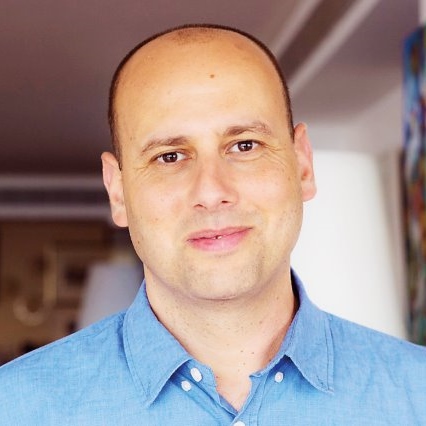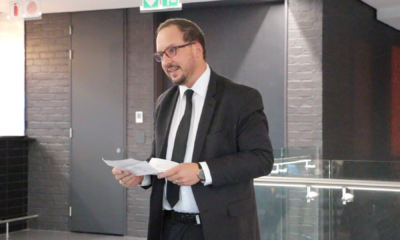
Israel

The war in Ukraine through Israeli eyes
Published
2 years agoon
Almost a million Israelis are former citizens of the Soviet Union, most of whom arrived in the 1990s. However, in Israel, they are still considered olim hadashim (new immigrants). A third of this million originally came from Ukraine and a little less from present-day Russia.
I assume no country in the world has so many newly formed and large communities (relative to its population) of immigrants from the former Union of Soviet Socialist Republics.
Therefore, everything related to “Mother Russia” remains a sensitive topic on the Israeli agenda, particularly when hundreds of thousands of Russian olim have family and descendants still living in the former Soviet Union.
Then there’s the open wound of Israel’s neighbouring country – Syria. The unpleasant struggle between Israel and Syria goes back more than a decade. It started as a civil war in Syria and an uprising against the Assad regime, which was stabilised after the intervention of Russia and Iran in support of the current administration.
Then, there’s Iran, which uses Syrian soil to build bases close to Israel’s northern border and to ship arms to its proxies in Lebanon. Because of this, Israel is attacking Iranian forces there on a daily basis. These attacks are most likely co-ordinated with the Russians.
In Syria, the Russians support the Assad regime on the one hand and, on the other, they give Israel space to keep the Iranians at bay.
It hasn’t been simple to convince Israel to support the aggressive sanctions that the West has imposed swiftly and decisively on the Russian economy.
According to senior foreign ministry officials, Israel preferred to be invisible or unnoticed and continue to sit on the fence as long as it could. However, the government chose to support the United Nations’ vote to condemn Russia’s decision, but still refrained from cancelling flights or cutting economic ties.
Israel hoped the West would understand the complexity of its situation and be satisfied with the UN declarations and the extensive Israeli humanitarian assistance to Ukraine.
I must admit, public sentiment in Israel also reflects some support for the Russian aggression towards reclaiming “lost homeland” districts.
The same sentiment reminds us of the history of the Jews in Ukraine, which is full of horrifying tales of pogroms perpetrated by the evil and brutal Cossacks who attacked Jews, raped women and pillaged villages. This was all part of the Ukrainian antisemitism for generations, which included the Babyn Yar massacre. Because of this, it’s not inconceivable that some Israelis prefer the Russian side – or rather any side that’s not Ukrainian.
President Volodymyr Zelenskyy, a charismatic Jew who leads the Ukrainian opposition, seems less impressive to some Israelis because of their historic anti-Ukrainian sentiments.
Another issue whispered among Israelis and is that Israel needs to be cautious in supporting sanctions against Russia for occupying territory. They fear that by supporting this, the world might later turn on Israel on issues relating to the West Bank. They might think it justifies sanctions against Israel.
The bottom line: “It’s complicated,” government officials in Jerusalem are telling the Israeli public and the world.
In the meantime, Israeli Prime Minister Naftali Bennett is surprisingly attempting to mediate between President Vladimir Putin and Zelenskyy. This is an extreme bungee jump for a hopeless negotiation that’s suitable only to a young, hungry leader who believes he has nothing to lose. He’s clearly still innocent enough to believe his job is to stop the horrors, even if the chances are very slim.
This diplomatic intervention gives Israel a few more days of grace regarding its artificial neutrality. Even as Switzerland and Finland, as well as Ikea and Netflix, choose sides, Israel still procrastinates.
The war in Ukraine, however, is a total shock and is horrifying to us, much more than the battles in Ethiopia, the Russian invasion of Georgia or the Crimea at the time. All over the world, civilians are suffering and there are still wars. But governments, the masses and subsequently businesses and companies all look at this crisis differently.
A superpower country with an authoritarian leader, Putin, taking over a democratic state that hasn’t threatened anyone sounds familiar. It’s like the anschluss, the annexation of the Sudetenland, and Hitler’s desire to revive the historic Reich.
The heroic stance of the Ukrainians, at least on social media, stirs in us memories of what unifies and separates us once again, splitting good and evil – freedom; liberty; liberal democracy; sovereignty; and self-determination. We stand behind Ukraine because this invasion threatens once again our clear vision of how we want to live.
Meanwhile, a renewed nuclear agreement is being reached between Iran and world powers. This creates anxiety for Israel as it reminds itself that it has no one but itself on which to rely.
In the same way that the West abandoned Ukraine (as opposed to the commitment to protect its borders after giving up nuclear weapons), so, in the event of Iran’s nuclear arms or G-d forbid a war with Israel, Israel will be completely alone – with many messages of support and solidarity on social media, flags on buildings around the world, but alone at the front.
Following Bennett’s negotiations, with the destruction that Russia continues to reap and the humanitarian catastrophes of sieges and refugees, Israel must be on the right side of history.
Furthermore, Israel must be on the side of those who consistently support us. We aren’t alone, after all.
Only a few countries arm Israel, vote for Israel, protect Israel and fund Israel generously.
Israel should be there fully – and the sooner the better.
Russia won’t remember our twists and turns. The United States and its allies will bear in mind this infidelity and human morality will remind us of it forever in history.
It’s done. The world has changed again. It has gone backward. There are good guys and bad. Even if the Ukraine crisis is resolved quickly, Putin compromises, and the war ends, caution from Russia will continue to grow.
The North Atlantic Treaty Organisation (Nato) and the European Union will be strengthened and it’s clear which side Israel has to be on.
Advocate Zvika (Biko) Arran is a social entrepreneur. He lives in South Africa with his wife, Liat, the Jewish Agency representative in South Africa, and their children.










